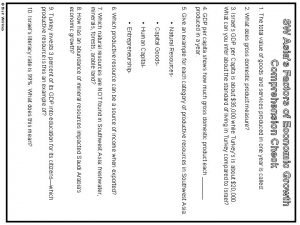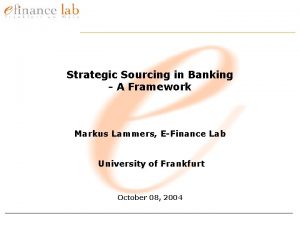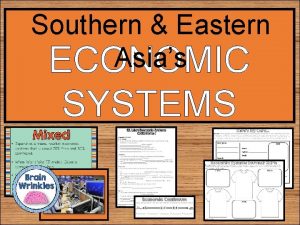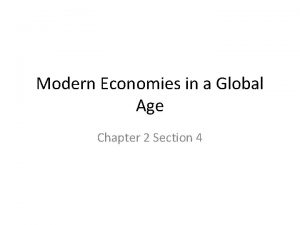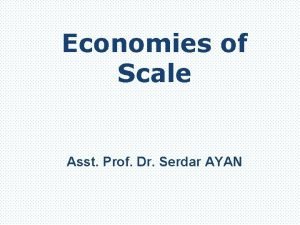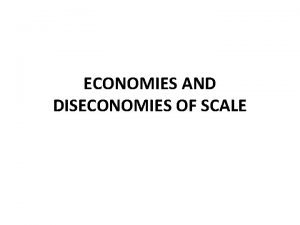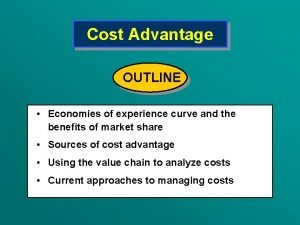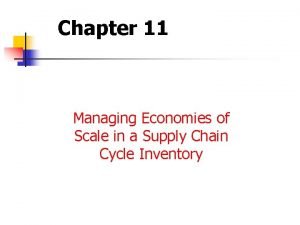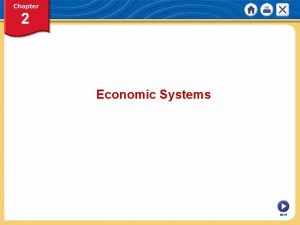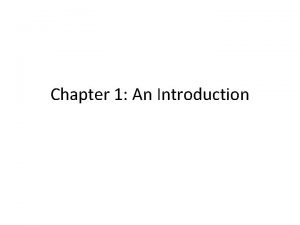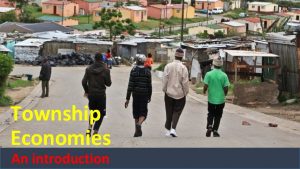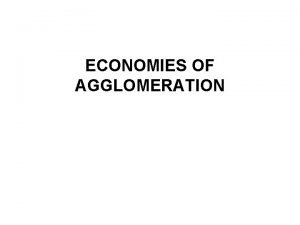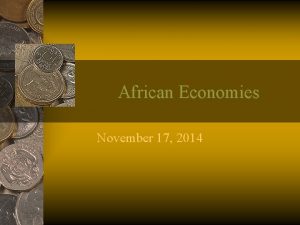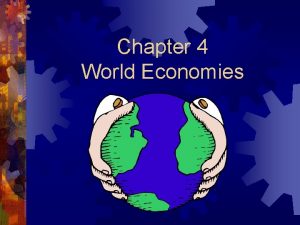Township Economies An introduction What is a township

















- Slides: 17

Township Economies An introduction

What is a township economy/enterprise? • “Township economy” refers to enterprises and markets based in the townships • Township enterprises are diverse, with high rate of informality and are also survivalist - 70% do not last beyond 3 years (GEM, 2014) • Are mostly micro-enterprises born of necessity, characterised by poverty and low-incomes; many were born out of opportunity • Both types have produced successful black entrepreneurs who have ‘graduated’ from exclusively serving the township economy (World Bank: 2014) 2

Eastern Cape border industry

Transkei and Ciskei • In June 1960, then Prime Minister, Verwoerd, announced that a permanent committee for the location of industry and the development of border areas would be appointed. • He defined border areas as "those localities or regions near the Bantu areas, in which industrial development takes place through European initiative and control, but which are so situated that the Bantu workers can maintain their homes and family life in the Bantu areas and move readily to their places of employment".

• To encourage industrialists to set up factories in border areas, inducements were to be offered — the provision of basic services such as water, power and transport and lower wages – 20% to 50% lower • More inducements were later offered — tax concessions, provision of complete factories at low rentals, concessions on railway rates, establishment of fully planned industrial townships, assistance in provision of housing for white personnel (housing for African workers being already the responsibility of the Department of Bantu Administration and Development), facilities for mortgage loans and so on • During the period 1960 -66 border industries gave employment to some 57, 000 persons of whom about 44, 000 were Africans

Eastern Cape border industry • Apartheid border industry policy led to creation of industrial parks located far away from established cities and infrastructure • Involved major state expenditure on new road and rail links, building of new settlements in areas where normal economic considerations would not have placed them 6

Eastern Cape border industry • Included former Bantustan border industry industrial parks (Dimbaza, Butterworth, Ezibileni, Fort Jackson etc) • Only a few enterprises survived after the removal of state subsidies in 1994; e. g. Dimbaza now only has about 3 out of around 128 factories, many Butterworth factories are abandoned 7

The context: comparing our three typical economic zones Townships/informal settlements Former border industry Metros and towns Third world infrastructure Mostly cannibalised, destroyed infrastructure Modern/world class infrastructure Emerging and survivalist Limited industrial presence; “scrap Well established businesses metal economy”; mostly emerging and survivalist Second economy Limited first economy, mostly second economy First economy Semi/under-developed Remnants of modern industry; mostly semi/under-developed Well developed Based on a diagram from a 2014 presentation on the Gauteng Township Revitalisation Strategy 8

The context: why revitalisation is important • To overcome the persistent dichotomy between developed cities and towns and former border industry zones and feeder townships: • We need to change townships from labour reserves, largely consumption based, into productive hubs that attract investment • Need to use local labour to benefit local people • Need to integrate township SMMEs into formal value chains 9

The rationale for Township Economic Revitalisation • A quarter (24. 35% or about 11. 6 million) of South Africa's population of 47. 8 million people live in the 76 largest townships in the country. Township/exbantustan population is a large proportion of the EC’s population • People from the townships and peri-urban areas should be fully integrated into the core of the Eastern Cape (and national) economy • Township/former Bantustan area economic contribution must grow from its current tiny share of Gross Regional Product • To increase the number of sustainable entrepreneurs beyond the usual threeyear mortality rate through interventions across the whole value chain of enterprise development • Savings clubs and stokvels have substantial funds and the majority are to be found in the townships • Use potential consumption of the township population to create partnerships that will convert the townships from consumer outposts to productive centres 10

What’s needed: a proposed methodology Following what was done elsewhere: • Conduct desktop work to establish extent of EC informal sector and types of business operating • Select sample representative townships in all EC regions • Conduct township roadshows to solicit inputs for a Township Economy Revitalisation Strategy and call for written submissions • Conduct regional workshops for consolidation of key issues emerging • Present consolidated regional outcomes at a province-wide Township Revitalisation Summit

Regional workshop methodology should aim to get inputs on the following: • Quality and accessibility of government business support services • Quality of responses by government officials in dealing with entrepreneurs and aspirant ones • Quality of operating facilities/spaces/land within the township • Management of traders operating outside the demarcated zones • Markets/market access and information to sell products • Relationships/partnerships with established business • Relationship with foreign-owned business, in particular within the retail sector. • Provision of municipal and government services such water, sanitation, and electricity

The Township Summit methodology should • Summarise key issues arising in district summits • Agree on key strategic areas that need further work in support of growing and integrated township economies • Define these more clearly and prioritise them in order of importance

Such key strategic focus areas might include: • Appropriate legal and regulatory framework • Promotion of productive activities/manufacturing • Appropriate economic and social infrastructure • Logistics for emerging business • Promotion of entrepreneurship • Finance and investment • Partnerships with established business • Market access • Innovation and R&D

Work on key strategic focus areas should aim to: • Agree on intended interventions for each area • Develop initial action plans for their implementation

Possible additional research • A baseline study on the township economies and their contribution to the provincial and national economies • Work with research institutions e. g. universities, Statistics South Africa to build a knowledge base about the township economy • Development of methodologies for assessing social and economic impact of township enterprises. • Branding and quality standards for a ‘township economy enterprise’

Can we turn around the economies of our townships?
 Sw asian economies comprehension check
Sw asian economies comprehension check Outsourcing defintion
Outsourcing defintion Economic systems chart
Economic systems chart Section 4 modern economies
Section 4 modern economies Benefits of economies of scale
Benefits of economies of scale Serdar ayan
Serdar ayan Define diseconomies of scale
Define diseconomies of scale Experience curve benefits
Experience curve benefits Types of economies of scale
Types of economies of scale A key to reducing lot size without increasing costs is to
A key to reducing lot size without increasing costs is to Managing economies of scale in a supply chain
Managing economies of scale in a supply chain Economies of scale ap human geography
Economies of scale ap human geography Mixed economies in a sentence
Mixed economies in a sentence Chapter 2 lesson 2 mixed economies
Chapter 2 lesson 2 mixed economies Economies of scale ap human geography
Economies of scale ap human geography Business ethics in a global economy chapter 10
Business ethics in a global economy chapter 10 Sw asia economies cloze notes 1
Sw asia economies cloze notes 1 Characteristics of mixed economy
Characteristics of mixed economy
